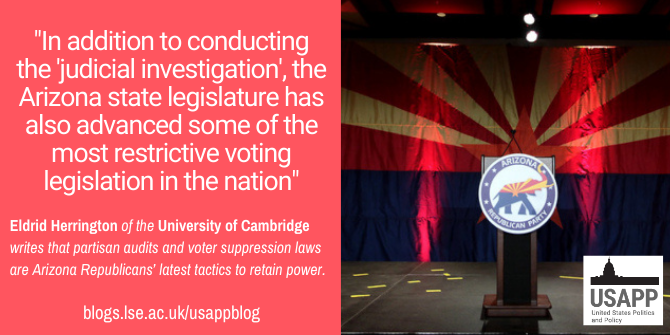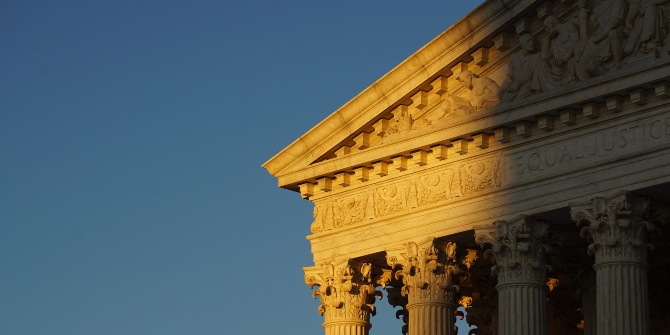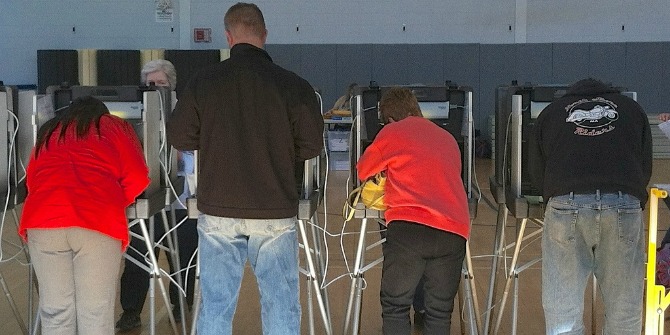Even after the conclusion of the 2020 election, Arizona remains a battleground state. As part of that the fight for the Grand Canyon State, Republican-sponsored legislation and partisan ballot recounts are being tested out in Arizona, which has become a bellwether for actions in other purple states across the nation. Eldrid Herrington highlights yet another recount of 2020 ballots in the state, bills that have the potential to restrict voter access, and looks at trends that could influence voting in 2022 and 2024.
- Following the 2020 US General Election, our mini-series, ‘What Happened?’, explores aspects of elections at the presidential, Senate, House of Representative and state levels, and also reflects on what the election results will mean for US politics moving forward. If you are interested in contributing, please contact Rob Ledger (ledger@em.uni-frankfurt.de) or Peter Finn (p.finn@kingston.ac.uk).
Why Maricopa?
All eyes are on Maricopa County: since 1912, when Arizona became a state, only one candidate has won the presidency without winning the county. In the 2020 election, few counties in the United States flipped from red to blue. Maricopa, where two thirds of Arizona’s 2.1 million votes were cast, was critical to inaugurating a newly purple state. In 2020, the margin of Biden’s win statewide was 10,457 votes and, as in Georgia, Mark Kelly’s win to become the second Democratic US senator in the state was critical for the overall composition of the US senate.
But even if Biden had lost Arizona, he still would have won nationally. The prominence of Arizona in Republican minds is tied to a specific event. On Election Day, Fox News called Arizona for Biden long before any other broadcast news organization, infuriating Trump and his supporters. This, in addition to the Democratic gains in the state, appears to have prompted the actions of certain Arizona Republican state legislators, many of whom are now in open conflict with fellow Republican state and local officials.
An audit or not an audit?
Arizona’s 2020 election votes have undergone several formal audits by state bipartisan groups and by federal officials. In all cases the vote tallies have been verified with no change. However, the majority Republican Arizona state senate has now commissioned a “legislative investigation” that is not an official audit and that has no power to change the vote. Republican legislators in other states hope to emulate this model, in a new kind of political theatre that the Washington Post’s Dan Zak has called a “nonviolent adminsurrection”.
Sherlock Who?
The investigation is being conducted by a private Florida-based company called Cyber Ninjas, whose CEO, Doug Logan, appears to have made public claims of voter fraud. The company has never undertaken any form of voting audit or investigation before and a number of lawsuits have been lodged which challenge the company’s practices, citing a lack of compliance with recognized national auditing standards and shifting and opaque ballot counting methods. The investigation was due to finish in May but will likely be completed in July; the form that any report will take is not clear.
In another feature of the case, One American News Network (OAN), a private, partisan news outlet, has broadcast the proceedings live from the Arizona Veterans Memorial Coliseum while its host Christina Bobb has solicited funds for the investigation on air.
Pigeons, proms, and politics
One of the state senate and state elector candidates named on the ballot, Anthony Kern, has been photographed conducting ballot counts during the state senate’s investigation. Also making an appearance in the Coliseum are US Representative Andy Biggs and Arizona State Representative Mark Finchem, who was also present on the steps of the US Capitol on January 6th, 2021. The ballots have been packed up temporarily while the Coliseum was used for high school graduations. Pigeons have flown into the arena, potentially compromising ballots. The wrong color pens have been used, in another potential breach. Feathers and ink are flying.

“Arizona Republican Party victory party” (CC BY-SA 2.0) by Gage Skidmore
Will the real Bill Gates please stand up?
Cyber Ninjas’s conduct has infuriated the Maricopa County Board of Supervisors, which comprises four Republicans and one Democrat. Its Republican chair, Jack Sellers, has described the company’s activities as “a grift disguised as an audit.” The fact that one Republican member of the board is named Bill Gates and voting machines use Microsoft products has been a gift to the conspiracy-minded.
Voting laws
In addition to conducting the “judicial investigation”, the Arizona state legislature has also advanced some of the most restrictive voting legislation in the nation. Two bills have passed and six are pending. Senate Bill (SB) 1485 requires election officials to remove voters from the early voting list if they don’t vote early every two years. Voters who forget to sign their voting envelopes will find it much harder to remedy this omission because of SB 1003. On the floor now are bills that will restrict voting by mail and increase barriers to register to vote: SB 1241 would criminalize any signature mismatch, to be adjudicated by officials who are not handwriting experts. This is a provision that is held to be discriminatory to voters whose signatures change because they are young, old, disabled, or ill. SB 1713 makes stringent ID requirements, which are held to impact disproportionately on the elderly, disabled, and voters of color, who typically vote for Democrats. A series of further bills – SB 1358, House Bill (HB) 2792, HB 2793, and HB 2811 – particularly restrict who, how, and when voters can register and obtain ballots and, like legislation in other states, direct some of those restrictions not just towards voters but also towards election officials. The Arizona house has also passed a resolution declaring their opposition to any federal voting rights bills that might pass in the US Senate.
Arizona and the Voting Rights Act 1965
At the very moment that restrictive voting rights bills are being passed in the Arizona state legislature, the Supreme Court is hearing a case, Brnovich v. Democratic National Committee [DNC], that could change the Voting Rights Act of 1965, and specifically section 2, which prohibits the imposition of any “qualification or prerequisite to voting or standard, practice, or procedure…in a manner which results in a denial or abridgement of the right of any citizen of the United States to vote on account of race or color”. The suit was brought in respect of two of Arizona’s existing voter laws, which criminalize any assistance with collecting ballots and reject ballots cast in the incorrect precinct. The DNC holds that these disproportionately impact on voters from minority backgrounds.
2022 Senate election
Senator Mark Kelly (D) won by a slim margin last year and his seat is a prime national target. According to the Washington Post, the National Republican Senatorial Committee has conducted internal polling in order to weigh the effect of the various tactics they are employing: questioning the validity of the vote through partisan investigation and voting legislation.
In addition to the potential damage of internal strife, the long-standing and right-leaning Arizona poll organization HigherGround has noted the partisan perceptions and potential damage of the investigation in a state presently split evenly between Republicans, Democrats and independents.
There are some factors which are outside of Republicans’ control. Population changes could also have an impact on the 2022 and 2024 elections. For example, the Native American vote was significant in Arizona’s 2020 elections; in 2021 there has been a 30 percent increase in tribal enrolment in the Navajo/Diné Nation this year, a significant proportion of whom vote in Arizona as well as New Mexico and Utah.
And Republicans’ restrictive voting legislation could have the opposite of its intended effect, instead galvanizing left-leaning grassroots and political organizations, even in a non-presidential year in which Democratic voter engagement tends to fall.
Please read our comments policy before commenting.
Note: This article gives the views of the authors, and not the position of USAPP – American Politics and Policy, nor the London School of Economics.
Shortened URL for this post: https://bit.ly/2SuDtR7
About the author
Eldrid Herrington – University of Cambridge
Eldrid Herrington is a lecturer in English literature at Cambridge and a Senior Research Fellow in medicine at Queen Mary, University of London. She was recently a Visiting Fellow in history at Oxford.






